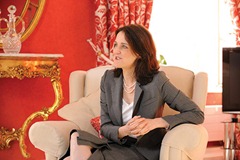Theresa Villiers interview: time to grasp the opportunities
 Theresa Villiers takes a firm line on welfare reform and calls on the business community to use Coalition Government policy and the UK’s diplomatic network to its advantage. The Secretary of State discusses her political outlook and priorities with Peter Cheney.
Theresa Villiers takes a firm line on welfare reform and calls on the business community to use Coalition Government policy and the UK’s diplomatic network to its advantage. The Secretary of State discusses her political outlook and priorities with Peter Cheney.
Two months after her arrival in Belfast, Theresa Villiers will not be drawn on a Plan B as an alternative to devolving corporation tax but is keen to see Northern Ireland benefitting from the Bank of England’s Funding for Lending scheme, regardless of the result.
The Secretary of State is also adamant that welfare reform will proceed and, despite local opposition, asserts that it will benefit society. A decade of centenaries can, in her view, also help to build a genuine shared future.
Villiers joined the Conservatives after graduating from university and “spent several years delivering lots of leaflets and knocking a lot of people’s doors.” Her political breakthrough came in 1999, when she stood for a European Parliament seat in London. She recalls: “I didn’t really expect to get elected but actually found myself as an MEP and spent six years in the European Parliament before standing for Westminster.”
Another divided society, Cyprus, caught her attention during her time in Europe. London was home to a “very significant” British Cypriot population and the island was applying for EU membership at that time. When Villiers was elected to Parliament for Chipping Barnet in 2005, she found that she again had many Cypriot constituents “and they continue to take a great interest in efforts to re-unite Cyprus and bring its communities together.”
She was Minister of State at the Department for Transport from May 2010 until her move to the NIO in September. “Life in government is tremendously hard work,” Villiers comments. “You don’t get a great deal of down-time but our rationale is to make a difference, to make life better for people, and that kind of driving goal makes the hard work worthwhile.”
Pressed on her longer term political ambitions, she replies that she is “quite happy with the job that I’ve got to be honest.” Being Secretary of State, she claims, is “definitely the best job in the Cabinet as you get to spend lots of time in Northern Ireland which is such a great place, full of such great people.”
Politically, she defines herself “on the Euro-sceptic end of the Conservative Party” and believes “very strongly in sound public finances, free markets and the Thatcherite agenda.” That said, looking after the vulnerable should be “a driving priority in government” and she judges that by the level of social mobility provided by the education and welfare systems.
On the economic front, she has been particularly impressed by inward investment in financial services (and financial services technology) and the “burgeoning creative industry” demonstrated by the Paint Hall studios in the Titanic Quarter. She also highlights the continued dependence on public sector spending and the “urgent” need to rebalance the economy as the main economic challenges facing the province.
“The work that we’re doing to put the public finances back in order is obviously crucial for Northern Ireland, as it is for the rest of the UK,” Villiers continues. Without that discipline, she says, the UK would experience “spiralling interest rates and the sort of crisis that has beset other European countries.”
Many ordinary people, it is put to her, have not seen the ‘light at the end of tunnel’ despite the UK technically emerging from recession. She agrees that there is “a long way to go” before prosperity is restored to the level that people want to see and acknowledges that the squeeze in real incomes is causing “real hardship”.
Raising the income tax threshold, she points out, has taken 25,000 people in Northern Ireland out of the tax system. Villiers comments: “A real focus of our approach to austerity is to try and ensure that the burdens are fairly shared, so that we do as much as we can to protect those who are on the lowest incomes and need the most help.”
Many interest groups, though, have voiced their fears that welfare reform will increase hardship for the poorest in society. In response, she lists the Coalition Government’s proposals to adapt reform to meet Northern Ireland’s needs i.e. continued direct payments to landlords, fortnightly (rather than monthly) benefit payments and some scope for split payments between parents.
While the Government was “very anxious to do what we could” to respond to the province’s specific circumstances, she describes herself as “a very strong supporter of the overall thrust of the welfare reform.” The end result, in her view, will be a much simpler system, which is “easier to navigate,” and which will give the best help to those who need welfare payments. In the long term, she also contends that it will be “fairer for the tax-payer as well” i.e. by reducing social security spending.
Economy and security
Villiers sets out the economy, security and a shared future as her three main priorities. The first involves assisting the Northern Ireland Executive in its work in rebalancing the economy, promoting the province as a “fantastic place to do business” and also helping to ensure that the Funding for Lending scheme “really starts to filter through”.
The latter scheme was launched by the Bank of England and Treasury in August and allows participating banks to borrow funds from the Bank of England at reduced rates. The Government is “pushing the weight of its balance sheet” to help banks lend to businesses in a “safe and responsible” way.
Regional unemployment for July-September stood at 7.6 per cent, unchanged since the last quarter but just below the UK average (7.8 per cent). Both rates, she says, are “too high” and getting bank credit to flow is “crucial” in responding to the problem.
 The decision on devolving corporation tax had been referred to Downing Street at the time of the interview. Villiers emphasises that Westminster’s policies can support economic growth i.e. low interest rates due to fiscal consolidation, the lower income tax threshold which “helps to push money back into the economy,” welfare reform, tax incentives for creative industries and improving broadband infrastructure.
The decision on devolving corporation tax had been referred to Downing Street at the time of the interview. Villiers emphasises that Westminster’s policies can support economic growth i.e. low interest rates due to fiscal consolidation, the lower income tax threshold which “helps to push money back into the economy,” welfare reform, tax incentives for creative industries and improving broadband infrastructure.
“I think, personally as well, it’s very important for Northern Ireland to be able to benefit from the UK’s global network of embassies,” she adds. One of Cameron’s first acts in government was to demand a strong economic focus from British diplomats and embassies and these are “a real asset to Northern Ireland.”
The UK has 111 embassies and 37 high commissions in Commonwealth countries.
Turning to the Executive, she welcomes the £200 million Economy and Jobs Initiative, planning reform, and its work on tackling underachievement in schools which can, in turn, can make the province more competitive. Villiers also commends both universities and highlights Queen’s University Belfast’s specialisation in financial services: “The advantages Northern Ireland has, in terms of education, are ones that we can really use to market Northern Ireland round the world.”
National security remains a “significant responsibility”. While the number of terrorism-related incidents has decreased since 2010, the threat level remains severe.
“Sadly, the threat from the terrorists that remain in Northern Ireland is very real, as we’ve seen tragically illustrated in the last few weeks,” Villiers says, “but huge efforts are going in by the PSNI to suppress the capability and to combat the attacks that the DR [dissident republican] groups continue to mount.”
Dissident republicans have “lethal intent” but “very little support in the community” as shown by the response to David Black’s murder. The killing, it is put to her, was a very public and ruthless act and the public will understandably be fearful.
“These terrorists will not succeed in dragging Northern Ireland back to the past,” she states. “That, I think, was illustrated by the universal condemnation of the act. Of course, the UK Government remains determined to do whatever we can to combat these terrorists. I think it came across very clearly that the people of Northern Ireland are committed to democracy and consent as a way to determine their future and they will not accept violence as a means to subvert the political process.”
David Cameron has raised a shared future with Villiers “as an issue which he thinks is very important.” Progress on dealing with the legacy of the Troubles “would be helped with a solution that recognises the pain that victims and survivors have been subjected to and are still experiencing.”
When attending the 25th anniversary commemoration of the Enniskillen bombing, she was struck that the legacy of the Troubles “is still very real for many people”. However, she also thinks that “we need to look to initiatives which help the whole of Northern Ireland move forward, to come to terms with the past, so that it’s part of our efforts to deliver a genuinely shared future.”
There will always be different perspectives on Irish history but Villiers sees the decade of centenaries as an opportunity for people to “respect each other’s perspectives”. The Secretary of State was therefore pleased that the Ulster Covenant parade passed off largely peacefully and welcomes the Irish Government’s willingness to work with the UK Government on how to mark the centenaries successfully.
The signing of the covenant in 1912, though, was an exclusively unionist event and was commemorated in that way. Responding to that point, she says that it is important to “broaden out” the approach and look at other centenaries that are coming up.
“Of course, very important ones relate to World War One and the Somme, where literally thousands of soldiers from what is now Northern Ireland and what is now the Republic of Ireland died side-by-side,” Villiers notes.
“I think that’s an opportunity to look at our shared past, across Northern Ireland and the rest of the UK and indeed the Republic of Ireland as well, because I think there are things that we have in common.”
Born in 1968, Theresa Villiers grew up in north London, and studied law at the University of Bristol and Jesus College Oxford. She worked as a barrister and law lecturer at King’s College London before entering politics. While she has described herself as a workaholic, she enjoys cycling and spending time with friends. With “all the assets of London on the doorstep,” she regrets not being able to get out to the theatre as often as she would like. In opposition, she was Shadow Chief Secretary to the Treasury (2005-2007) and Shadow Transport Secretary (2007-2010).







